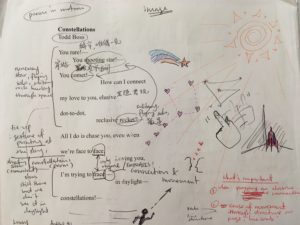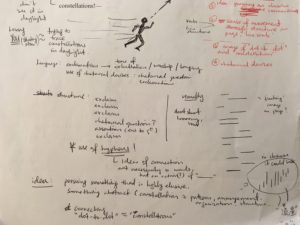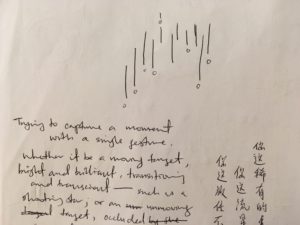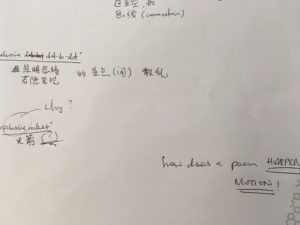Dr. Ryan Thorpe teaches creative writing and literature at the University of Michigan-Shanghai Jiao Tong University Joint Institute. He is the fiction and poetry editor of The Shanghai Literary Review and manages a public workshop for anyone interested in creative writing. He writes columns for The Global Times, has published in numerous literary journals, and is currently working on a creative writing textbook. More information on his work can be found at www.rythorpe.com.
Money for the Dead
When I first heard of tomb sweeping day in China, I worried about my own ancestors. As a friend described the ritualistic way that Chinese people burned fake money and other paper goods to the dead, I imagined what this system might actually look like if it were true. If only China burned money from the dead, then my ancestors might be destitute. As a Christian family, we prayed instead of burning paper gold ingots, so this Tomb Sweeping Day, I decided to fix this mass inequity that might exist in the afterlife. At this moment, my grandparents might be working in some wealthy Chinese household in the afterlife, sweating the day away while their employers counted money burned by their relatives.
I shouldn’t have been surprised by this move to monetize the afterlife, though. If anyone were going to create a financial system for the forever after, it would be China. After two years of living there, I have seen parents’ dedication towards earning money and creating a better future for their children. Today, though, I wanted to even the playing field and help my ancestors overcome their circumstances and give them some of the peace they deserved.
To accomplish this, I turned to my girlfriend, Melissa. As a native Chinese, she might be in a position to instruct me on the finer parts of sending money to the afterlife. She had once described the people in her village burning paper money to their ancestors along the river that ran through her small village in Hubei. She explained how their small mounds of a paper money, paper houses, and paper iPhones caught fire, and how the smoke rose farther and farther up in the sky until it collected in some kind of celestial inbox. She suggested the area around Dongbaoxing Road, not far from my apartment, because that area hosted a large crematorium, and of all the areas of Shanghai, that would be the most likely place to offer gifts to the dead.
As we walked, we tried to decide to whom we would burn gifts.
“My grandparents, of course,” I said. “Isn’t it bad luck to burn gifts to the living?”
She nodded seriously as if I had just stumbled onto some great truth, and I tried to not think about who I might want to curse by burning some money their way. If burning money to the dead might give them money, then maybe burning money to the living might take it away. I wasn’t sure how the check book of the universe worked, but the thought distracted me from the task of seriously sending gifts to my grandparents.
“You can send money to anyone dead,” she said. “What about someone famous? If they’re from America, then they could probably use the money.”
“Shakespeare?” I offered. “He might need a little something.”
“That’s one thick envelope,” she said.
As we boarded the subway towards the area near the crematorium, she tried to explain to me the way it all worked. First we would buy gifts and place them in a special envelope with the name of the recipient on the front with my name and the date in black marker. Then, we would draw a chalk circle on the ground, placing the gifts in the center, and then lighting them on fire. Everything had to burn completely. As the fire died down, I would light three sticks of incense, hold them in both of my hands, and bow towards the fire. After thinking good thoughts about the recipients of my gift, I would stick the incense in the ground near the burning site.
The entire ceremony sounded simple enough, but I felt unsure about enacting the process. With this ceremony, I walked on foreign territory. As I went through these motions, others would see me, judge me, question my sincerity as I tried to honor my ancestors with a foreign tongue. I also imagined Shakespeare’s face when he received all these gifts from some random American in China, two nations he barely knew. His lips fumbling over the slippery words.
“Do you think we should get Shakespeare something extra?” Melissa asked. “He’s one of your favorite authors. I feel like we should do something special.”
“Like what?”
“Let’s burn an iPhone to him. Shakespeare would be an Apple user if her were alive today.”
I tried to imagine that as well, but as I imagined Shakespeare compiling a music list, downloading his favorite apps, and navigating the Internet on his iPhone, he felt less like Shakespeare to me. The Shakespeare I knew stood locked away in a time vault with a quill in one ink-dyed hand. “Let’s see,” I said.
We exited the subway, and I followed my girlfriend around while she politely asked people where we could find a store that sold the gifts for the dead. No one was sure where we could find such a place. At the grocery store, the clerk hinted at a place closer to the subway station. Near the subway station, she asked a pedicab driver who told us that it was near and for 10 RMB, about a dollar and a half, he could take us there. My girlfriend thanked him, and we kept walking. At the front of a nice apartment complex, a security guard told her that it could be found down the road past the grocery store.
Melissa turned and announced our direction with a smile. “I knew I could find this place.”
I followed after her with the umbrella and her ten pound purse that contained a laptop, back up umbrella, and the other uncountable things hidden within the folds of a woman’s purse. As my arm ached, I thought about how Shakespeare might appreciate her MacBook and a few other items as an offering, but I stayed silent. Without her help, I would never come close to completing this ritual. Alone in Shanghai, my language abilities kept me restricted to certain activities, and burning money for dead ancestors required speaking only in Chinese. In this ritual, the dead were mono-lingual, and I required her translation services.
The rain fell slowly as if the sky felt unsure about what it wanted to do, but a light rain meant a safer ground. Melissa explained how we couldn’t carry around the gifts to the dead into other people’s shops because having these gifts near someone living caused bad luck. These were items that were purchased and then immediately burned to avoid contaminating the land of the living.
We found the store a half-kilometer beyond the grocery store in a small shop with metal racks and stacks and stacks of paper money, silver and gold paper ingots, and paper gold bars that could be burned as an offering. Melissa explained the situation to the old man who ran the shop and who nodded gravely at her description of our intentions. The old man felt concerned about the likelihood that my gifts would reach my ancestors, but he dug around until he found a large, yellow envelope with a large seal on the front in Chinese. He explained to Melissa its importance who then translated his message to me.
“He says that this is a special long distance envelope,” she said. “It’s like DHL for the afterlife.”
I nodded as if I understood the difference between one envelope and another, but I needed this man to understand that I was serious about giving money to my ancestors. He suggested sending only American money and hard currency like gold because he wasn’t sure if the spirit world would react well to Chinese money flying towards American and British recipients. After glancing over all the paper goods, we selected several stacks of hundred dollar bills and a box of gold ingots, which we felt would be valuable in any context. No matter what the exchange rate, gold carried some value. As I looked at the fake Chinese money that held denominations in the thousands and millions, I wondered if inflation were a serious concern in heaven, and maybe money lost all value due to its inflation over time. In this society, something random like tin or rosewood might carry the value of precious materials, but I decided to leave the economics of the afterlife to the Chinese experts. I would send whatever they recommended.
In this case, the shopkeeper recommended several bundles of tissue paper as an accelerant because unfortunately, American paper money failed to burn as well as some other currencies, and the man did not want us staring at a fire that failed to get going. Even the gods fell victim to the basic laws of thermodynamics. We selected a large bundle of tissue paper and piled our goods on the closest table.
After writing Shakespeare’s name on one envelope and my grandparents’ names on the other, Melissa consulted with the guy where to burn our pile of gifts. He gave us directions to a place by the river just a block away, and we thanked him several times. He thanked us with a thick smile for our purchase and handed us a stick of chalk and a small bundle of incense.
I wanted to photograph the old man, standing there in the frame of his little concrete store with the crowded shelves of cursed gifts for the dead, but it didn’t feel right. Like much related to death, I felt like he should only be observed rather than recorded, as if death suffered from a life-long affliction of camera shyness.
A short walk later, we found ourselves on a little pedestrian path next to a river. Behind some bushes, small groups of people stood beside their own burning offerings. Melissa and I skirted past the first group of people who maintained five offering piles burning and found ourselves an empty stretch of sidewalk. The air hung thick with smoke, and our eyes burned while we juggled the bags of offerings, the umbrella, the heavy purse. Melissa took everything from me and handed me one bag of offerings and the chalk.
“Make our circles like theirs,” she suggested with a glance at the ground next to us. I looked at their circle, which looked more like a long over with two lines jutting out from one of the long sides. In this way, the oval never closed but stood open, and I was sure that had some sort of significance, but I did not know what it was.
The chalk kept breaking against the wet pavement, until I held a fragment of chalk less than a half an inch long. I used different fragments of chalk to finish my two circles, but after some effort, they were complete. Melissa suggested breaking the ingot box apart to use the lid as and boxes as bases for my offering, and I immediately liked the idea. I started on Shakespeare’s offering pile. I first layered several handfuls of tissue paper while trying to light the hundred dollar bills on fire. The entire process proved far harder than I imagined. With the rain dripping on my fire, the smoke of the other wet fires filling up our eyes, and the hundred dollar bills refusing to burn, several minutes passed before the small fire started going.
Melissa passed me a short length of plywood that she had found near someone else’s abandoned offering pile, and I used it to try and open up my fire a little and get all the layers of money to light up properly. After the fire started to burn, Melissa handed me the plastic bag of paper gold ingots, and I sprinkled those on sparingly, making sure each of them caught fire and burst into a strange green flame for a moment before succumbing to the heat. As the pile burned lower, I broke open the incense and grabbed three sticks. I lit them in the flames like Melissa instructed me, and I slowly bowed three times, trying to think of all the moments Shakespeare touched my life from England to Duke to Texas to Shanghai. He served as a drawstring that cinched up much of my past, and as I bowed for the third time, I thanked him as much as one can thank the dead. I did not say any words. Instead, I tried to feel thankful and hoped that the smoke would carry my sentiments beyond the clouds.
I planted the incense in the flowerbed near the offering site and started in on my grandparents’ pile. Melissa called my name, and I looked up. She was taking my picture, and I smiled in reaction.
“Don’t smile,” she said. “This isn’t a smiling time.”
My smiled faded, and I went back to focusing on the funeral pile. I repeated the process of offering up the paper gifts, and I only relaxed when I lit the incense. I bowed the first time, thinking about how long it had been since I had seen my grandparents. They died when I was still young and a lap grandchild that was passed from person to person like a puppy. I bowed a second time, trying to remember what they looked like, their faces buried in memories more than half a life ago. The thick grey eye brows of my grandfather that always looked like he was about to ask a question. The kind smile of my grandmother who always smiled like she had just finished baking something. I bowed a final time and focused on thanking them for making the man I was today. Despite their distance, I always felt like they surely maintained some hand in my life from the afterlife. Looking down on me from their position and shaping my will towards a man I would be proud to be. I planed the incense in the flowerbed and then poked the fire with my stick to try to ensure that it was completely burned through.
I joined Melissa under the umbrella. She couldn’t see due to the smoke. The smouldering remains of my offerings inside the smudged chalk circles still released little bursts of smoke, but for the most part they stood silent. We left the unburned incense and our plywood stick and tossed our garbage as we headed back to the subway. We passed other families waiting on the steps up to the street for a spot to open up next to the river. The bags containing their gifts to the dead hung from their hands. As I passed, they politely nodded. I nodded back. I did not smile.
Continue reading




